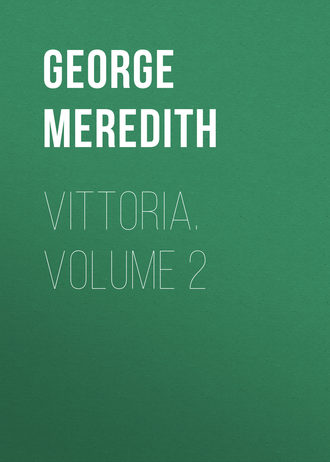
George Meredith
Vittoria. Volume 2
'You appear to me to want more,' said the lieutenant audibly to himself; and he repeated words to the same effect to his companion, in bad German.
'Eh? You would promote him to another epaulette?' laughed Captain Weisspriess. 'Come off. Orders are direct against it. And we're in Milan—not like being in Verona! And my good fellow! remember your bet; the dozen of iced Rudesheimer. I want to drink my share, and dream I'm quartered in Mainz—the only place for an Austrian when he quits Vienna. Come.'
'No; but if this is the villain who attacked me, and tore my coat from my back,' cried Wilfrid, screwing in his saddle.
'And took your letter took your letter; a particular letter; we have heard of it,' said Weisspriess.
The lieutenant exclaimed that he should overhaul and examine the man, and see whether he thought fit to give him into custody. Weisspriess laid hand on his bridle.
'Take my advice, and don't provoke a disturbance in the streets. The truth is, you Englishmen and Irishmen get us a bad name among these natives. If this is the man who unhorsed you and maltreated you, and committed the rape of the letter, I'm afraid you won't get satisfaction out of him, to judge by his look. I'm really afraid not. Try it if you like. In any case, if you halt, I am compelled to quit your society, which is sometimes infinitely diverting. Let me remind you that you bear despatches. The other day they were verbal ones; you are now carrying paper.'
'Are you anxious to teach me my duty, Captain Weisspriess?'
'If you don't know it. I said I would "remind you." I can also teach you, if you need it.'
'And I can pay you for the instruction, whenever you are disposed to receive payment.'
'Settle your outstanding claims, my good Pierson!'
'When I have fought Jenna?'
'Oh! you're a Prussian—a Prussian!' Captain Weisspriess laughed.
'A Prussian, I mean, in your gross way of blurting out everything.
I've marched and messed with Prussians—with oxen.'
'I am, as you are aware, an Englishman, Captain Weisspriess. I am due to Lieutenant Jenna for the present. After that you or any one may command me.'
'As you please,' said Weisspriess, drawing out one stream of his moustache. 'In the meantime, thank me for luring you away from the chances of a street row.'
Barto Rizzo was left behind, and they rode on to the Duomo. Glancing up at its pinnacles, Weisspriess said:
'How splendidly Flatschmann's jagers would pick them off from there, now, if the dogs were giving trouble in this part of the city!'
They entered upon a professional discussion of the ways and means of dealing with a revolutionary movement in the streets of a city like Milan, and passed on to the Piazza La Scala. Weisspriess stopped before the Play-bills. 'To-morrow's the fifteenth of the month,' he said. 'Shall I tell you a secret, Pierson? I am to have a private peep at the new prima donna this night. They say she's charming, and very pert. "I do not interchange letters with Germans." Benlomik sent her a neat little note to the conservatorio—he hadn't seen her only heard of her, and that was our patriotic reply. She wants taming. I believe I am called upon for that duty. At least, my friend Antonio-Pericles, who occasionally assists me with supplies, hints as much to me. You're an engaged man, or, upon my honour, I wouldn't trust you; but between ourselves, this Greek—and he's quite right—is trying to get her away from the set of snuffy vagabonds who are prompting her for mischief, and don't know how to treat her.'
While he was speaking Barto Rizzo pushed roughly between them, and with a black brush painted the circle about Vittoria's name.
'Do you see that?' said Weisspriess.
'I see,' Wilfrid retorted, 'that you are ready to meddle with the reputation of any woman who is likely to be talked about. Don't do it in my presence.'
It was natural for Captain Weisspriess to express astonishment at this outburst, and the accompanying quiver of Wilfrid's lip.
'Austrian military etiquette, Lieutenant Pierson,' he said, 'precludes the suspicion that the officers of the Imperial army are subject to dissension in public. We conduct these affairs upon a different principle. But I'll tell you what. That fellow's behaviour may be construed as a more than common stretch of incivility. I'll do you a service. I'll arrest him, and then you can hear tidings of your precious letter. We'll have his confession published.'
Weisspriess drew his sword, and commanded the troopers in attendance to lay hands on Barto; but the troopers called, and the officer found that they were surrounded. Weisspriess shrugged dismally. 'The brute must go, I suppose,' he said. The situation was one of those which were every now and then occurring in the Lombard towns and cities, when a chance provocation created a riot that became a revolt or not, according to the timidity of the ruling powers or the readiness of the disaffected. The extent and evident regulation of the crowd operated as a warning to the Imperial officers. Weisspriess sheathed his sword and shouted, 'Way, there!' Way was made for him; but Wilfrid lingered to scrutinize the man who, for an unaccountable reason, appeared to be his peculiar enemy. Barto carelessly threaded the crowd, and Wilfrid, finding it useless to get out after him, cried, 'Who is he? Tell me the name of that man?' The question drew a great burst of laughter around him, and exclamations of 'Englishman! Englishman!' He turned where there was a clear way left for him in the track of his brother officer.
Comments on the petty disturbance had been all the while passing at the Caffe La Scala, where sat Agostino Balderini, with, Count Medole and others, who, if the order for their arrest had been issued, were as safe in that place as in their own homes. Their policy, indeed, was to show themselves openly abroad. Agostino was enjoying the smoke of paper cigarettes, with all prudent regard for the well-being of an inflammable beard. Perceiving Wilfrid going by, he said, 'An Englishman! I continue to hope much from his countrymen. I have no right to do so, only they insist on it. They have promised, and more than once, to sail a fleet to our assistance across the plains of Lombardy, and I believe they will —probably in the watery epoch which is to follow Metternich. Behold my Carlo approaching. The heart of that lad doth so boil the brain of him, he can scarcely keep the lid on. What is it now? Speak, my son.'
Carlo Ammiani had to communicate that he had just seen a black circle to Vittoria's name on two public playbills. His endeavour to ape a deliberate gravity while he told the tale, roused Agostino's humouristic ire.
'Round her name?' said Agostino.
'Yes; in every bill.'
'Meaning that she is suspected!'
'Meaning any damnable thing you like.'
'It's a device of the enemy.'
Agostino, glad of the pretext to recur to his habitual luxurious irony, threw himself back, repeating 'It 's a device of the enemy. Calculate, my son, that the enemy invariably knows all you intend to do: determine simply to astonish him with what you do. Intentions have lungs, Carlo, and depend on the circumambient air, which, if not designedly treacherous, is communicative. Deeds, I need not remark, are a different body. It has for many generations been our Italian error to imagine a positive blood relationship—not to say maternity itself—existing between intentions and deeds. Nothing of the sort! There is only the intention of a link to unite them. You perceive? It's much to be famous for fine intentions, so we won't complain. Indeed, it's not our business to complain, but Posterity's; for fine intentions are really rich possessions, but they don't leave grand legacies; that is all. They mean to possess the future: they are only the voluptuous sons of the present. It's my belief, Carlino, from observation, apprehension, and other gifts of my senses, that our paternal government is not unacquainted with our intention to sing a song in a certain opera. And it may have learnt our clumsy method of enclosing names publicly, at the bidding of a non- appointed prosecutor, so to, isolate or extinguish them. Who can say? Oh, ay! Yes! the machinery that can so easily be made rickety is to blame; we admit that; but if you will have a conspiracy like a Geneva watch, you must expect any slight interference with the laws that govern it to upset the mechanism altogether. Ah-a! look yonder, but not hastily, my Carlo. Checco is nearing us, and he knows that he has fellows after him. And if I guess right, he has a burden to deliver to one of us.'
Checco came along at his usual pace, and it was quite evident that he fancied himself under espionage. On two sides of the square a suspicious figure threaded its way in the line of shade not far behind him. Checco passed the cafe looking at nothing but the huge hands he rubbed over and over. The manifest agents of the polizia were nearing when Checco ran back, and began mouthing as in retort at something that had been spoken from the cafe as he shot by. He made a gabbling appeal on either side, and addressed the pair of apparent mouchards, in what, if intelligible, should have been the language of earnest entreaty. At the first word which the caffe was guilty of uttering, a fit of exasperation seized him, and the exciteable creature plucked at his hat and sent it whirling across the open-air tables right through the doorway. Then, with a whine, he begged his followers to get his hat back for him. They complied.
'We only called "Illustrissimo!"' said Agostino, as one of the men returned from the interior of the caffe hat in hand.
'The Signori should have known better—it is an idiot,' the man replied.
He was a novice: in daring to rebuke he betrayed his office.
Checco snatched his hat from his attentive friend grinning, and was away in a flash. Thereupon the caffe laughed, and laughed with an abashing vehemence that disconcerted the spies. They wavered in their choice of following Checco or not; one went a step forward, one pulled back; the loiterer hurried to rejoin his comrade, who was now for a retrograde movement, and standing together they swayed like two imperfectly jolly fellows, or ballet bandits, each plucking at the other, until at last the maddening laughter made them break, reciprocate cat-like hisses of abuse, and escape as they best could—lamentable figures.
'It says well for Milan that the Tedeschi can scrape up nothing better from the gutters than rascals the like of those for their service,' quoth Agostino. 'Eh, Signor Conte?'
'That enclosure about La Vittoria's name on the bills is correct,' said the person addressed, in a low tone. He turned and indicated one who followed from the interior of the caffe.
'If Barto is to be trusted she is not safe,' the latter remarked. He produced a paper that had been secreted in Checco's hat. Under the date and the superscription of the Pope's Mouth, 'LA VITTORIA' stood out in the ominous heavily-pencilled ring: the initials of Barto Rizzo were in a corner. Agostino began smoothing his beard.
'He has discovered that she is not trustworthy,' said Count Medole, a young man of a premature gravity and partial baldness, who spoke habitually with a forefinger pressed flat on his long pointed chin.
'Do you mean to tell me, Count Medole, that you attach importance to a communication of this sort?' said Carlo, forcing an amazement to conceal his anger.
'I do, Count Ammiani,' returned the patrician conspirator.
'You really listen to a man you despise?'
'I do not despise him, my friend.'
'You cannot surely tell us that you allow such a man, on his sole authority, to blacken the character of the signorina?'
'I believe that he has not.'
'Believe? trust him? Then we are all in his hands. What can you mean? Come to the signorina herself instantly. Agostino, you now conduct Count Medole to her, and save him from the shame of subscribing to the monstrous calumny. I beg you to go with our Agostino, Count Medole. It is time for you—I honour you for the part you have taken; but it is time to act according to your own better judgement.'
Count Medole bowed.
'The filthy rat!' cried Ammiani, panting to let out his wrath.
'A serviceable dog,' Agostino remarked correctingly. 'Keep true to the form of animal, Carlo. He has done good service in his time.'
'You listen to the man?' Carlo said, now thoroughly amazed.
'An indiscretion is possible to woman, my lad. She may have been indiscreet in some way I am compelled to admit the existence of possibilities.'
'Of all men, you, Agostino! You call her daughter, and profess to love her.'
'You forget,' said Agostino sharply. 'The question concerns the country, not the girl.' He added in an underbreath, 'I think you are professing that you love her a little too strongly, and scarce give her much help as an advocate. The matter must be looked into. If Barto shall be found to have acted without just grounds, I am certain that Count Medole'—he turned suavely to the nobleman—'will withdraw confidence from him; and that will be equivalent to a rope's-end for Barto. We shall see him to- night at your house?'
'He will be there,' Medole said.
'But the harm's done; the mischief's done! And what's to follow if you shall choose to consider this vile idiot justified?' asked Ammiani.
'She sings, and there is no rising,' said Medole.
'She is detached from the patriotic battery, for the moment: it will be better for her not to sing at all,' said Agostino. 'In fact, Barto has merely given us warning that—and things look like it—the Fifteenth is likely to be an Austrian feast-day. Your arm, my son. We will join you to-night, my dear Count. Now, Carlo, I was observing, it appears to me that the Austrians are not going to be surprised by us, and it affords me exquisite comfort. Fellows prepared are never more than prepared for one day and another day; and they are sure to be in a state of lax preparation after a first and second disappointment. On the contrary, fellows surprised'—Agostino had recovered his old smile again—'fellows surprised may be expected to make use of the inspirations pertaining to genius. Don't you see?'
'Oh, cruel! I am sick of you all!' Carlo exclaimed. 'Look at her; think of her, with her pure dream of Italy and her noble devotion. And you permit a doubt to be cast on her!'
'Now, is it not true that you have an idea of the country not being worthy of her?' said Agostino, slyly. 'The Chief, I fancy, did not take certain facts into his calculation when he pleaded that the conspiratrix was the sum and completion of the conspirator. You will come to Medole's to-night, Carlo. You need not be too sweet to him, but beware of explosiveness. I, a Republican, am nevertheless a practical exponent of the sacrifices necessary to unity. I accept the local leadership of Medole—on whom I can never look without thinking of an unfeathered pie; and I submit to be assisted by the man Barto Rizzo. Do thou likewise, my son. Let your enamoured sensations follow that duty, and with a breezy space between. A conspiracy is an epitome of humanity, with a boiling power beneath it. You're no more than a bit of mechanism—happy if it goes at all!'
Agostino said that he would pay a visit to Vittoria in the evening. Ammiani had determined to hunt out Barto Rizzo and the heads of the Clubs before he saw her. It was a relief to him to behold in the Piazza the Englishman who had exchanged cards with him on the Motterone. Captain Gambier advanced upon a ceremonious bow, saying frankly, in a more colloquial French than he had employed at their first interview, that he had to apologize for his conduct, and to request monsieur's excuse. 'If,' he pursued, 'that lady is the person whom I knew formerly in England as Mademoiselle Belloni, and is now known as Mademoiselle Vittoria Campa, may I beg you to inform her that, according to what I have heard, she is likely to be in some danger to-morrow?' What the exact nature of the danger was, Captain Gambier could not say.
Ammiani replied: 'She is in need of all her friends,' and took the pressure of the Englishman's hand, who would fair have asked more but for the stately courtesy of the Italian's withdrawing salute. Ammiani could no longer doubt that Vittoria's implication in the conspiracy was known.







